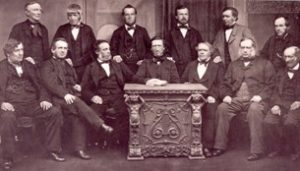I hear it all the time, no-one’s got a good word for committees. Committees are domineering, inflexible and take too long to make decisions.
A camel is a horse desi gned by a committee, they say. Jolly well designed some might say (me) given their usefulness and amazing capacity to withstand desert heat and they have three sets of eyelids and two rows of eyelashes to keep sand out of their eyes and can completely shut their nostrils during sandstorms!
gned by a committee, they say. Jolly well designed some might say (me) given their usefulness and amazing capacity to withstand desert heat and they have three sets of eyelids and two rows of eyelashes to keep sand out of their eyes and can completely shut their nostrils during sandstorms!
But seriously maybe it’s because people don’t know how to make a committee work well, or they’re only thinking about how to get their own way?
Not all committees are like that though. I give you one of the greatest committees in UK history – the Rochdale Pioneers! From the most uncertain beginnings, this committee of 28 artisans (half of them weavers) managed to put together £28 with which they bought butter, sugar, flour, oatmeal and candles, and opened their now famous store in Toad Lane Rochdale in 1844. Three months later they added tea and tobacco and by the end of their first year, they had 80 members and £182 capital. Just 56 years later there were 1439 co-ops in every area of the UK. There are now 3 million co-ops around the world, with 1.2 billion members*. Some committee!
Here’s 13 of them, in 186 5, as the Rules of the Rochdale Equitable Pioneers Society were adopted by the International Co-operative Alliance as International Co-operative Principles.
5, as the Rules of the Rochdale Equitable Pioneers Society were adopted by the International Co-operative Alliance as International Co-operative Principles.
There’s more to this story here.
Wouldn’t you think that if we bring together a group of people with a range of different opinions, experience, skills and knowledge, they would be better at problem solving than one individual working on their own?
Sadly, this is often not the case as our aversion to the word ‘committee’ demonstrates. But does it have to be like this?
My experience working with co-operatives for over 30 years leads me to believe that it doesn’t, but that we need to learn how to work together. By that I mean building trust by having respect for each other; listening to others’ opinions, expressing ourselves clearly, establishing clear goals and agreeing working methods. We need to learn how to address conflict when it arises, not to fear it but to explore it, which we can do once we have built a foundation of trust and respect.
*not all of them inspired by our Rochdale Pioneers, but many of them with constitutions based on International Co-operative Principles, which in 1865 were themselves based on the Rules of the Rochdale Equitable Pioneers Society, founded in 1844.
